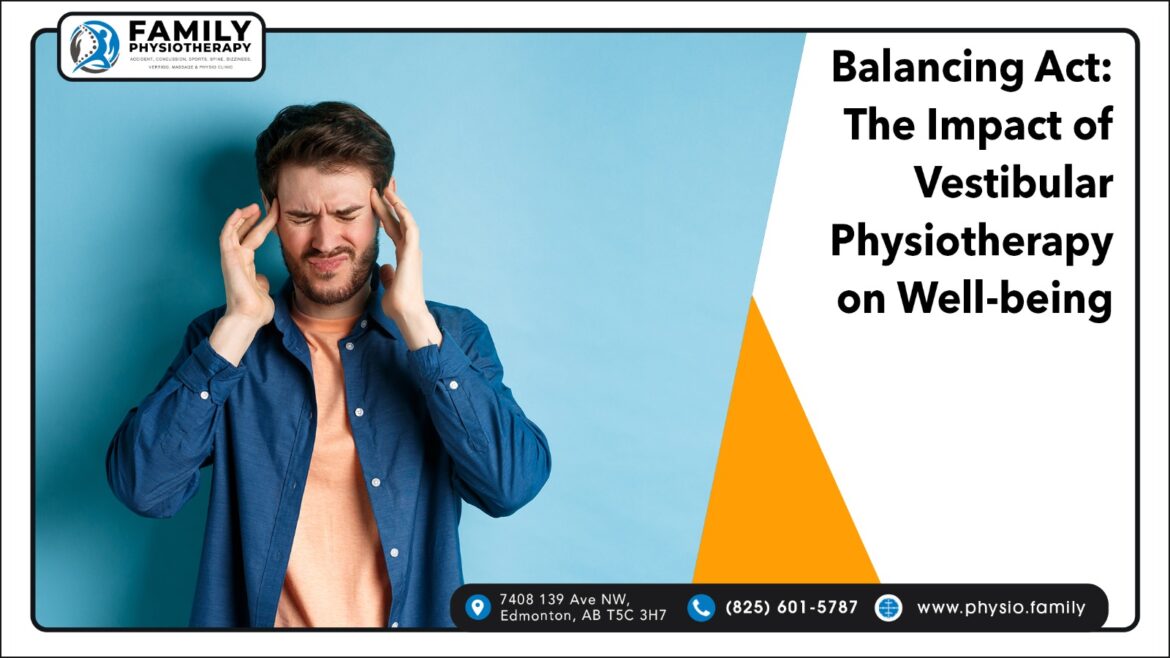The intricate balancing act of the human body is a marvel that is often taken for granted until disrupted. Vestibular disorders, affecting balance and spatial orientation, can significantly impede daily life, leading to challenges that go beyond mere physical symptoms. Vestibular Physiotherapy in Edmonton at Family Physiotherapy has emerged as a vital intervention in restoring this delicate balance, profoundly impacting overall well-being.
Vestibular Disorders and Their Impact
Vestibular disorders arise from complications in the inner ear and vestibular nerve, which are essential for balance and spatial awareness. Symptoms such as dizziness, vertigo, issues with balance, nausea, and visual problems like trouble focusing or following moving objects are common. These symptoms vary in intensity, being either mild or severe, and can be continuous or occur in episodes.
The widespread impact of these symptoms can significantly interfere with everyday life. Routine activities such as walking, using stairs, or simply standing can become challenging and pose a risk of falls. The unpredictability of experiencing dizziness or vertigo can also cause anxiety and stress, as individuals cannot anticipate when these episodes might occur. This anxiety can intensify the physical symptoms, leading to a cycle of physical and emotional turmoil.
How Vestibular Physiotherapy Helps
1. Physical Health and Mobility
Vestibular physiotherapy focuses on restoring balance and reducing dizziness, key factors that limit physical mobility in those with vestibular disorders. Patients improve their mobility and stability through gait and balance training and proprioceptive exercises, which are essential for daily activities like walking and climbing stairs. This enhancement in physical mobility often leads to a decrease in pain and discomfort, enabling a more active and independent lifestyle.
2. Mental and Emotional Well-being
Conditions like vertigo and chronic dizziness can be mentally and emotionally taxing, often leading to anxiety and depression. Vestibular physiotherapy helps alleviate these debilitating symptoms through relaxation and breathing techniques, providing patients with a sense of control over their condition. As the physical symptoms improve, there is often a corresponding improvement in mood and a decrease in anxiety-related symptoms.
3. Social Interaction and Confidence
Fear of experiencing dizziness or losing balance in public can cause individuals to withdraw from social activities. Vestibular physiotherapy equips patients with the confidence to engage in social interactions by improving their balance and reducing the fear of falling. As patients regain this confidence, they tend to participate more in social activities, enhancing their overall social well-being.
4. Independence and Daily Functioning
Improved balance and reduced dizziness directly contribute to greater independence in daily functioning. Patients can safely perform tasks that were challenging or risky before, such as driving, shopping, or engaging in hobbies. This regained independence fosters a sense of accomplishment and enhances overall life satisfaction.
5. Prevention of Secondary Complications
Vestibular physiotherapy plays a crucial role in preventing falls and other injuries associated with balance disorders. By improving balance and gait, the therapy minimizes the risk of fall-related injuries, which are particularly common and dangerous in older adults. Additionally, joint mobilization and strengthening help avoid developing compensatory movement patterns that could cause further physical problems.
6. Cognitive Function
The exercises and activities involved in vestibular physiotherapy could have a positive effect on cognitive functions. Activities that challenge balance and coordination can stimulate brain areas responsible for spatial navigation and memory. This cognitive stimulation is especially beneficial for older patients, for whom cognitive decline can be a significant concern. Various concentration and memory exercises and cognitive-behavioral strategies are employed.
7. Quality of Sleep
Symptoms of vestibular disorders, such as vertigo, can disrupt normal sleep patterns, leading to insomnia or poor-quality sleep. As vestibular physiotherapy reduces these symptoms, patients often experience an improvement in sleep quality. Better sleep contributes to overall health, including improved mood and cognitive function.
8. Reduction in Medication Dependency
Many patients with vestibular disorders rely on medication to manage symptoms, which can lead to side effects and long-term dependency. Effective vestibular physiotherapy can lessen the need for these medications by treating the root cause of the symptoms. This reduction in medication use is not only beneficial for the patient’s overall health but also aligns with a more holistic approach to healthcare.
Techniques Employed in Vestibular Physiotherapy
Canalith Repositioning Maneuvers (CRP)
CRP, including the Epley Maneuver, is used primarily to treat Benign Paroxysmal Positional Vertigo (BPPV). These maneuvers involve particular head and body movements that help to reposition displaced otoliths (ear crystals) in the inner ear. The therapist carefully guides the patient through a series of positions to move the crystals out of the semicircular canals and back into their correct position. This technique is known for its effectiveness in quickly reducing or eliminating symptoms of vertigo associated with BPPV.
Gaze Stabilization Exercises
These exercises are designed to improve control of eye movements so vision can remain steady during head movements. They are crucial for patients who experience visual disturbances with movement. Exercises may include focusing on a stationary object while moving the head or moving the eyes between different targets while keeping the head still. Gaze stabilization exercises help to strengthen the connection between the vestibular system and the eyes, reducing symptoms like dizziness and unsteadiness.
Habituation Exercises
These exercises are used to treat symptoms of dizziness that are provoked by specific movements or positions. These exercises involve gradually and repeatedly exposing the patient to the specific movements or positions that cause dizziness. Over time, this practice can lessen the severity of these symptoms. The objective is to train the brain to become more accustomed to these movements, thereby diminishing the body’s vestibular reactions.
Embracing a Holistic Approach to Balance and Well-being
Vestibular Physiotherapy represents a holistic approach to treating balance disorders. Its impact on overall well-being is profound, offering a pathway not just to physical recovery but to a happier, more active life. For residents in Edmonton, Family Physiotherapy stands as a beacon of hope, helping countless individuals navigate their way back to balance, health, and well-being.

